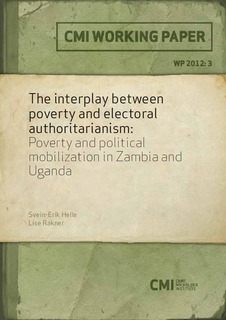| dc.contributor.author | Helle, Svein-Erik | |
| dc.contributor.author | Rakner, Lise | |
| dc.date.accessioned | 2018-01-04T08:18:46Z | |
| dc.date.available | 2018-01-04T08:18:46Z | |
| dc.date.issued | 2012-02-28 | |
| dc.identifier | oai:www.cmi.no:4393 | |
| dc.identifier.citation | Bergen: Chr. Michelsen Institute (CMI Working Paper WP 2012:3) 22 p. | |
| dc.identifier.isbn | 978-82-8062-430-7 | |
| dc.identifier.issn | 0804-3639 | |
| dc.identifier.uri | http://hdl.handle.net/11250/2474909 | |
| dc.description.abstract | In this paper we wish to analyze the interplay between the political setting of electoral authoritarianism and economic grievances expressed in particular by an urban poor electorate in Africa. We show that the outcomes of this interplay have varied considerably across the region. While opposition politicians in some countries such as Zambia (2011) have been able to channel the political discontent into electoral victories and subsequent electoral turnover, most electoral authoritarian regimes in Sub-Saharan Africa have managed to stay in power. Uganda is an example of this. The analysis of recent political developments in these two countries will highlight two interrelated questions: What may explain the variance found? And, are some forms of poverty more challenging for the survival of electoral authoritarian regimes than others? | |
| dc.language.iso | eng | |
| dc.publisher | Chr. Michelsen Institute | |
| dc.relation | CMI Working Paper | |
| dc.relation | WP 2012:3 | |
| dc.relation.ispartof | CMI Working Paper | |
| dc.relation.ispartofseries | CMI Working Paper WP 2012:3 | |
| dc.relation.uri | https://www.cmi.no/publications/4393-the-interplay-between-poverty-and-electoral | |
| dc.subject | Elections | |
| dc.subject | Authoritarianism | |
| dc.subject | Poverty | |
| dc.subject | Mobilization | |
| dc.subject | Regime Change | |
| dc.subject | Zambia | |
| dc.subject | Uganda | |
| dc.title | The interplay between poverty and electoral authoritarianism: Poverty and political mobilization in Zambia and Uganda | |
| dc.type | Working paper | |
